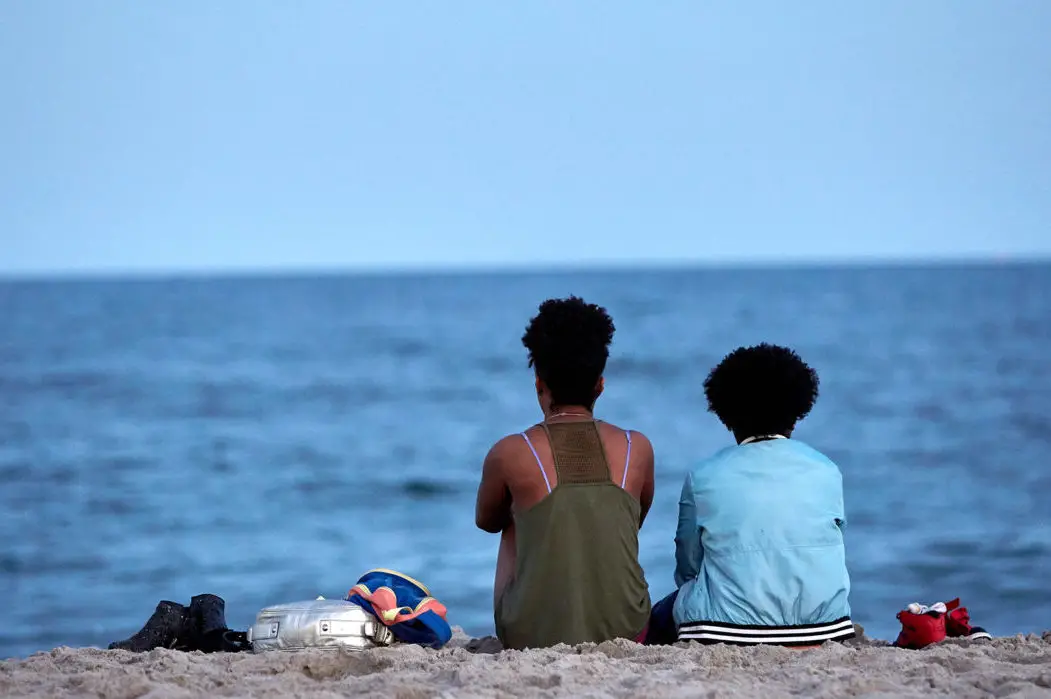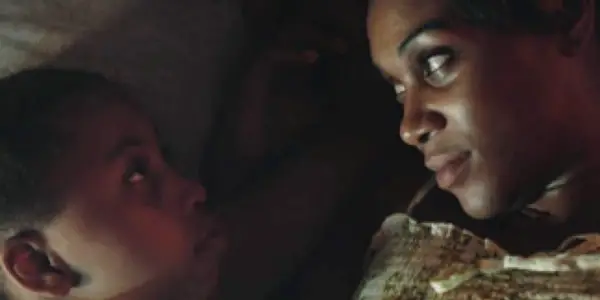NIGHT COMES ON: Love As A Beacon In The Dark

Amyana Bartley is a screenwriter and producer. Her company, Queen…
Night Comes On is a compelling depiction of loss, America’s system set up to fail people of color and the resilience of the human soul. Winner of the Next Innovator Award at Sundance Film Festival, writer Angelica Nwandu and writer/director Jordana Spiro create a powerful piece riddled with the harsh realities of a broken system’s discarded people and children.
Dominique Fishback stars as Angel Lemere, a down-and-out teen just released from juvenile detention. Having spent the vast majority of her years hopping from one foster home to another, being sexually abused along the way, she doesn’t know who she is or what she should do. Freed two days before her 18th birthday, Angel’s main focus is to avenge the murder of her mother (Natashia Fuller) at the hand s of her abusive father (John Jelks).
Her mother was the only source of love and comfort she and her baby sister, Abby (Tatum Marilyn Hall), ever knew. On the night of her murder, Angel could only watch in terror and she blames herself for not doing anything to stop her dad. Though they never had much money, Angel’s mother comforted her children by imagining the cars passing in the street are the sounds of ocean waves. Now, any imagery of the ocean reminds Angel of her mother.
Set Up To Fail
As soon as Angel steps out of juvenile, she’s literally on her own. She has no relatives to stay with save her estranged father. Her parole officer makes it very clear to her that no one cares what happens to her and the system that is supposed to help her find work has lost all of her identification that she needs to procure work. She’s too proud to ask assistance from her girlfriend and she barely has enough cash to afford any food. She sets out immediately to get a gun to kill her father, which she has to trade sex to get.

Angel’s sister Abby, now 10, is in a foster home of her own with people more interested in the money they receive for their foster kids than the children themselves. Abby longs to start a life with Angel since she’s finally turning 18, but Angel’s shame of her past creates difficulties in their relationship. Angel doesn’t feel like a good enough influence for her sister, so she fights to distance herself from Abby, both physically and emotionally.
Tatum Marilyn Hall is the absolute bright star of this film. Her performance as Abby is outstanding. Her emotional range far exceeds that of many adult performances I’ve seen. With her adorable quips and palpable disappointment in her surroundings, I loved her so much I wanted to adopt her! Even though Angel is eight years her senior, Abby provides insight and teaching to Angel throughout the film. Her persistent love and innocent belief penetrate Angel, helping to break down the emotional walls she’s built over years of pain.
Remembering The Love
As a first-time feature, director/co-writer Jordana Spiro weaves an intricate tale based on co-writer Angelica Nuwandu‘s life. With the help of cinematographer Hatuey Viveros Lavielle, Spiro captures the numb exhaustion of Angel’s character and the overwhelmed system, while mixing in the natural beauty of their surroundings and the young people Angel interacts with.
Thoughtfully displayed throughout the film, are references to the ocean as metaphors for the lingering support of Angel’s mother. It’s almost as if her mother is spiritually guiding Angel in all of her decisions, gently guiding her towards what is right.

For Angel, her mother’s memory and her sister are her reasons to push on. They are the “soft spot” to her tough exterior. Every time Angel picks up a shell; hears a car passing; talks about the beach; or even sees anything remotely beachy, her mother is there. There is an absolutely gorgeous scene when Angel and Abby visit the beach and finally get to play and be children.
The water literally rinses away their cares, worries and defenses. Though Abby never really has a problem being true to herself, this is the scene where Angel finally breaks and we get to see the real her. She becomes the little girl that she never gets to be nor has ever gotten to be. It’s a genuinely special scene for both characters and turns the tide for Angel.
Before she can move on and live the life she wants with her sister though, she still has to face her demon of revenge and find and face her father. Can she forgive herself and get past her anger in order to have what she wants?
The Hard Truth
According to an article published by Youth.gov, girls are the fastest growing population in juvenile detention in the US. Minority youth are over-represented in juvenile and more likely to be detained. African-American youth have the highest rate of involvement in juvenile detention as compared to other minorities. They make up 16% of in the general population, but 30% of juvenile court referrals, 38% of youth in residential population and 58% of youth admitted to state adult prisons. The average rate of rearrest for released juveniles is 55%. It’s no wonder to me, given how Angel is treated in Night Comes On.

These are children who have almost never had a responsible, capable adult around them to teach them about anything. Even Abby’s character didn’t know what to do when she first gets her period. We see a bunch of children without care or direction, who somehow have to fend for themselves with no prior help or life training. The system that is supposed to care for them is far too overwhelmed and exhausted with politics and red tape to do their jobs properly.
On top of all of that, rampant racism and the private prison industry ensure that people of color will never get a fair shake to live a successful life. Hence, these kids are set up to fail. They’re set up for lives of crime, prostitution, homelessness, little to no education and the inability to get work, in order to survive.
Night Comes On: Conclusion
I’ve spoken vociferously on Twitter to the importance of artist’s responsibilities in filmmaking. When a filmmaker has the opportunity and platform for a public voice, I believe it is incumbent upon them to make responsible choices in what they choose to create and be a part of. Several of my past reviews for films like Urban And The Shed Crew , Survivor’s Guide To Prison and Fantassut come to mind in thinking of recent films with powerful social messages like Night Comes On.
I can’t understate the need in our society for films like these. They highlight, in living color, the struggles of human existence that we wouldn’t otherwise experience in real life. They bring big problems and injustices to light for the whole world to see, and if done with passion and heart, can lift and inspire others to help right the wrongs of the world. The need for diverse voices in film is critical for this purpose! One race and gender simply cannot tell everyone’s stories with authenticity.
The story of this African American young woman is written by an African American woman. Though the director is a white woman, she seems to treat this story with respect and great care. The emotional components of these characters are omnipresent throughout the film and all of their intricacies are laid bare for the viewer to see. The metaphors woven in are subtle enough that it never comes off preachy or condescending, nor is the dialogue too wordy.
It is a film that will pull at your heartstrings while inciting anger over a broken system that fails our children. No matter the race, gender or identity of a child, they belong to our human family and deserve an equal chance in our society. If we are ever to call ourselves civilized, it is up to us to support the least of us and help each other be the best we can be.
As the saying goes, it truly does take a village to raise a child.
Night Comes On opens in theaters and video on demand Aug. 3, 2018.
Does content like this matter to you?
Become a Member and support film journalism. Unlock access to all of Film Inquiry`s great articles. Join a community of like-minded readers who are passionate about cinema - get access to our private members Network, give back to independent filmmakers, and more.
Amyana Bartley is a screenwriter and producer. Her company, Queen B. Productions, supports filmmakers of all walks, interested in creating thought provoking, moving projects. As her company grows, she will create "real jobs" for any talented artist, in front of and behind the screen, who is passionate about making a difference using the art of film.












